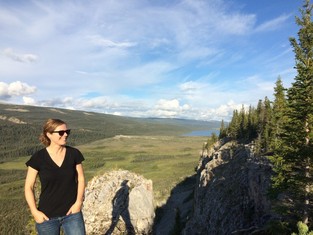 The NWT On The Land Collaborative is a collective of partners from government, industry, philanthropy, and beyond, working together to support land-based programs and projects in the NWT. Each of these partner organizations has a representative that participates in quarterly meetings and annual funding decisions. This is the fourth in a series of profiles of the people and organizations that make the Collaborative possible. You can read the other profiles here. Jess Dunkin’s resume is an interesting mix of two different kinds of experience: outdoor education and academia. She has instructor-level certifications in canoeing and first aid and a PhD in Canadian history. She has taught history and gender studies at Carleton University and the University of Ottawa and led canoe trips in the shield country of Northern Ontario. She has written articles for Pathways: the Ontario Journal of Outdoor Education and Histoire Social/Social History. The one thing that ties these two lives together is Jess’s love of the outdoors. Both have been valuable in her current position as Director of On the Land Programs at the NWT Recreation and Parks Association (NWTRPA) and as the NWTRPA’s representative on the NWT On The Land Collaborative. Jess has always had a special relationship to the outdoors. She grew up on a farm in Eastern Ontario and spent part of every summer at camp and her grandparents’ cottage: “I know that I need to be outside…It’s a place where I feel more connected to myself, I feel more connected to the world around me, and I feel more connected to the people I’m with.” It was this love of the outdoors that led Jess to pursue work in outdoor education while in high school, first as a camp counsellor and later leading canoe trips. She continued to work at summer camps and outdoor centres while in university and at Teacher’s College. A love of history led her to graduate school in 2007, where she channeled her passion for the outdoors into her research, writing about girls’ summer camps and canoeing. In 2014, Jess was wrapping up a postdoctoral fellowship at Queen’s University and looking for a next step. The academic job market was dire and there were few other opportunities for her in Ottawa. Jess had already been thinking about moving North, when she heard about the On the Land Programs Consultant position at the NWTRPA: “While I was in grad school I basically stopped paddling, I wasn’t really doing trips, I let my certifications lapse. I kind of thought I had left that life behind…When I started talking to Geoff [the NWTRPA’s Executive Director] about the job, I found myself circling back… and I was excited about that prospect.” Even before relocating to Yellowknife, Jess understood that there were very real differences between the outdoor education that had been her bread and butter down south and the on the land programs that she would be supporting in the North: “To me, land-based programs are about revitalizing the deep connections between Indigenous people, their territories, and traditional knowledges/practices targeted by colonialism. Land-based programs heal people and communities and the territories they call home and ultimately, they nurture self-determination and the restoration of traditional forms of governance.” Jess is keenly aware of being a non-Indigenous settler from the south in her position: “I have struggled to figure out how to do this work in a good way. I was really fortunate to be able to attend a Dechinta short course last spring and to be able to think through in a really practical way my responsibilities and my job, but it’s a process. I’m not there yet.” In 2014, the NWTRPA was invited to be part of the collaborative funding workshop that was the precursor to the NWT On The Land Collaborative. ED Geoff Ray went on behalf of the organization: “(At this meeting) the Tides Foundation, Nature Conservancy, Health & Social Services, and others each stood up in the room and made contributions of tens of thousands, in some cases hundreds of thousands of dollars. We didn’t have money to offer, but we had a pile of experience and expertise in training and relationships to communities and organizations that do on the land programs. We offered to contribute those resources, relationships, and connections.” That experience and those relationships come from a decade of delivering and supporting on the land programs in the NWT. Between 2007 and 2010, the NWTRPA organized the Mackenzie Youth Leadership Trip. The organization took a number of learnings from that experience, particularly around programming planning, training, and risk management, and has shared them with communities looking to offer similar programs. Geoff believes, “One of the strengths of the Collaborative is that you have a handful or more organizations who are coming from different backgrounds and mandates. You’ve government, non-government, and corporate interests coming together to support community-based programs. There are lots of different outcomes that people are working towards but I think it’s really exciting that you can have this diverse group of people working together in such a transformative way.” Working as the NWTRPA’s representative on the Collaborative has allowed Jess to put her diverse skills to work. When the NWTRPA first became a partner in the Collaborative in early 2016 that meant lending expertise in training. As time has gone by the NWTRPA has taken on additional roles assisting with information sharing and communications. These days, the Collaborative keeps Jess busy writing copy for the website, managing the social media accounts, and writing editorial content, such as partner profiles. For Jess, along with everything else, being part of the Collaborative has been an invaluable learning experience: “It has exposed me to lots of other people and programs that I otherwise wouldn’t have known about. It has also just been really inspiring to hear about the amazing land-based programming happening in the territory on both a large and a small scale.” Jess says that she’s still not always comfortable in her position, but the Collaborative has provided a space where she can work in a good way, guided by strong Indigenous leadership and local expertise. The NWT On The Land Collaborative depends on partners like the NWT Recreation and Parks Association to support land-based initiatives in the NWT. If your organization is interested in becoming a partner, please contact Steve Ellis ([email protected]).
12 Comments
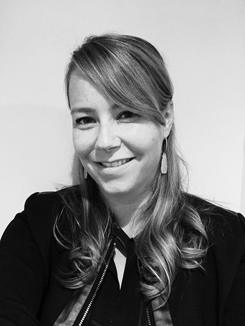 The NWT On The Land Collaborative is a collective of partners from government, industry, philanthropy, and beyond, working together to support land-based programs and projects in the NWT. Each of these partner organizations has a representative that participates in quarterly meetings and annual funding decisions. This is the seventh in a series of profiles of the people and organizations that make the Collaborative possible. You can read the other profiles here. Nicole McDonald is unabashedly passionate about collaboratives: “I love collaborative funding models!” In addition to making it easier for recipients to access funds, Nicole has seen firsthand how collaboratives can support projects that need a little extra help: “One of the things I found while working with the Saskatoon Collaborative Funding Partnership was that we could see groups doing good work, but they weren’t successful in their funding applications because they weren’t good at writing proposals.” To address this, the Partnership hosted workshops for prospective grantees on proposal writing and budget development. Almost immediately, they saw improvements in the quality of applications being submitted. Nicole, who is currently the Program Director for Indigenous Initiatives at the J.W. McConnell Family Foundation, has become something of an expert in collaboratives. At present, she is working with a variety of partners on a number of funding collaboratives which include: {Re}conciliation and the Arts; the Indigenous Innovation Demonstration Fund; and now, the NWT On the Land Collaborative. Collaboratives, Nicole believes, promote diversity by bringing different partners to the table and allow for a more efficient use of resources through shared administration. They can also serve as a gateway for people and organizations who might not have traditionally supported certain kinds of initiatives: “With the close of the Truth and Reconciliation Commission, we are seeing a growing number of organizations that want to fund Indigenous communities, but don’t know how to or where.” Enter initiatives like the NWT On The Land Collaborative: “Organizations are able to contribute as little or as much as they want, both in terms of financial resources and level of engagement with the Collaborative. Because there are other partners already sitting at the table, funding is automatically leveraged. Also, the governance structure is already in place to ensure that funding is going directly to communities, and the adjudication process is done in collaboration by community members and the partners.” If done right, it is low risk and high reward. The trajectory of the McConnell Foundation’s involvement in the NWT On The Land Collaborative is a case in point. When the opportunity to be involved as a partner in piloting the Collaborative, “it was kind of a no brainer,” Nicole admits. “Because it was a pilot, the initial level of funding was relatively low, so it wasn’t a huge risk.” More importantly, if it succeeded, it would have a significant impact. All the better that it fit nicely with one of the Foundation’s emerging priorities, reconciliation: “One of the ways in which we get at reconciliation is through reculturalization and being on the land is a huge part of that.” For her part, Nicole appreciates the flexibility of the collaborative funding model. Participants can be involved as much or as little as they want, something that appeals to her, given her current position. As the Program Director for Indigenous Initiatives, Nicole manages the McConnell Reconciliation Initiative, which currently has three priority areas: increasing the number of organizations and networks active in the reconciliation space; fostering innovative platforms for change; and supporting the use of social innovation and solutions finance tools in our Indigenous initiatives: “Right now, the McConnell Foundation has a large Indigenous portfolio with limited staffing. There are a lot of initiatives that we want to be supporting, so having the flexibility to have other partners step up and work with communities more directly is a bonus.” That the Foundation feels comfortable stepping back a little reflects the fact that they “trust the partners sitting at the table.” Though Nicole has been working with funding collaboratives for approximately 10 years, she is relatively new to the world of philanthropy. Prior to joining the McConnell Foundation in 2015, she worked in the public service. She had a hand in implementing the Common Experience Payment as part of the Indian Residential School Resolution; she worked on programming and policy with the Urban Aboriginal Strategy; and she was involved in community safety planning as part of the Government of Canada’s Missing and Murdered Indigenous Women Initiative. Nicole is Métis from Prince Albert, Saskatchewan, and has spent most of her life living on Treaty 6 Territory. In 2012, Nicole relocated from the prairies to Ottawa so that she could pursue new work opportunities. She never expected to work for a philanthropic organization, but she is glad that the opportunity presented itself: “It’s been the best two years!” For Nicole, there is no separation between her work life and her home life. Both she and her husband work in the Indigenous space and their five children are very involved as well. Her three sons are active in the Moosehide Campaign, a grassroots initiative working to address violence against women and girls. Inspired by a meeting with Cindy Blackstock, her daughters started a letter-writing campaign asking the Prime Minister to accept the Canadian Human Rights Tribunal 2016 ruling which found that the Government of Canada is discriminating against First Nations children living on-reserve. Her eldest son is a member of the Steering Committee for 4Rs, a youth movement committed to creating spaces for cross-cultural dialogue with an eye to transforming the relationship between Indigenous and non-Indigenous Canadians. All of this in addition to a busy schedule of swimming, soccer, hockey and synchronized swimming. One of their family traditions is to head back to Saskatchewan in the summer to spend time together on the land visiting with family, swimming, fishing, hiking and berry picking. Last summer they also had the opportunity to visit with Elder Maria Campbell at her traditional family’s homestead at Gabriel’s Crossing in Batoche. Nicole notes, “Being back home and on the land is important to our family as it helps to remind us of our identity, history, values and connection to mother earth.” The NWT On The Land Collaborative depends on partners like J.W. McConnell Family Foundation to support land-based initiatives in the NWT. If your organization is interested in becoming a partner, please contact Steve Ellis ([email protected]). 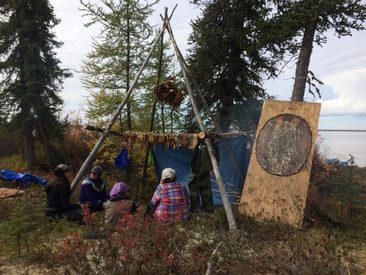 On the land programs promote community, family, and individual wellbeing, and are vital to healthy ecosystems and economies. This year, the NWT On The Land Collaborative will distribute $634,845 to 35 projects across the territory that connect NWT residents with their land, culture, and community. This is the second year that the Collaborative has been administering grants to on the land programs in the NWT. Coincidentally, the Collaborative also supported 35 projects in 2016. However, the average grant has risen by 62% to just over $18,000: “Although we are supporting the same number of projects this year, we have been able to fully fund more projects, which means that they don’t have to go elsewhere for funds to make their programs happen,” shares Steve Ellis of Tides Canada, one of the driving forces behind the Collaborative. As the funding pot grows, the Collaborative is better able to meet its mandate of making it easier and less time consuming for people to access funds for land-based programs. Grants range from $3000 to support a canoe trip for grade nine students in Fort Smith to $60,000 for healing and wellness camps for youth in Rádeyįlįkóé (Fort Good Hope). Other funded projects include Trails on the Land, a 10-day trip beginning in Tuktoyaktuk that will take youth and elders through the traditional hunting territory of their ancestors; a land-based youth mentorship project coordinated by the Deh Gah Gotine First Nation; a boating program for Tłįchǫ youth that teaches traditional knowledge and skills; and a hide tanning camp in Łutsel K’e. In addition to financial support, funded projects may also receive equipment, training, and program support. Quick Facts
Contacts Steve Ellis Northern Lead Tides Canada Email: [email protected] Jess Dunkin Director, On the Land Programs NWT Recreation and Parks Association Email: [email protected] 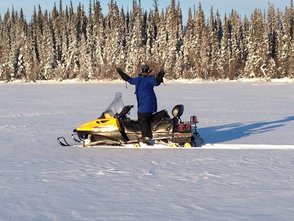 The NWT On The Land Collaborative is a collective of partners from government, industry, philanthropy, and beyond, working together to support land-based programs and projects in the NWT. Each of these partner organizations has a representative that participates in quarterly meetings and annual funding decisions. This is the sixth in a series of profiles of the people and organizations that make the Collaborative possible. You can read the other profiles here. If I were to make a word cloud of my interview with Erin Kelly (Environment and Natural Resources’ representative on the Collaborative), I suspect that collaboration, connection, and community would appear in bold, a reflection of her priorities as a scientist and as a public servant. Erin traces these priorities to her time as a graduate student at the University of Alberta: “I worked with David Schindler, a very applied scientist. Our involved communities in the Rockies and partnerships with other organizations like Parks Canada, so I learned a lot about working collaboratively. In my experience, meaningful partnerships, but particularly community involvement always makes things better.” Erin, who earned a doctorate in Environmental Biology and Ecology in 2007, joined the GNWT in 2010. Since then, she has served as a Water Specialist; the Manager of Watershed Programs & Partnerships; Assistant Deputy Minister for Environment and Natural Resources; and, most recently, as the Acting Deputy Minister for ENR. In those capacities, Erin has played a key role in a number of critical water and other environment-related initiatives. She worked on developing and implementing the Water Stewardship Strategy, she was a part of the negotiating team for the Transboundary Water Management Negotiations, and she led the development of the NWT Community-Based Water Quality Monitoring Program. Data from this program is publically available through Mackenzie Datastream, a collaboration between Erin and her team, Carolyn Dubois at the Gordon Foundation (another Collaborative member!), and others. In the almost two decades that she has been working in community-based science, Erin has had a lot of opportunities to speak with communities about what is important to them: “What I have heard time and again is that it all comes back to the experience of being on the land, but also ensuring that we provide opportunities for youth and elders to connect, so that there is a passing on of knowledge.” These kinds of conversations inform ENR programming, which includes long-standing youth programs like Tundra Science and Culture Camp and Take-a-Kid-Trapping. More recently, the department has been championing community-based monitoring and Guardian programs. Another thing that Erin heard repeatedly in conversations with community members was the importance of linking traditional knowledge and science. For this reason, she has worked hard at ENR to promote this kind of thinking and practice amongst her colleagues. (She suspects that this is why she was tapped by former Deputy Minister Ernie Campbell to represent the department on the Collaborative.) Erin is accustomed to being asked why ENR is part of the Collaborative. On the land programs are so often understood as being related to physical or cultural health, but Erin is clear that there are environmental outcomes as well: “Part of the healing work that on the land programs do is about being one with the environment.” Here, Erin acknowledges the impact of residential schools on this relationship and the need for reconciliation, “Land-based programs help give people back the bond that they have with the land and the water and the animals.” Repairing this relationship has important stewardship outcomes. Not to mention, to focus solely on environmental or health benefits ignores how all of these things are interconnected. As Erin notes, “You can’t really take apart the land, traditional economies, culture, and health. They are all inter-linked and inter-twined…On the land programming promotes holistic health: environmental health, including personal health, wildlife health, the health of water. Everything together.” There is also the fact that land-based programs, regardless of their intent, create opportunities for monitoring: “When people are out on the land, regardless of who they are, they will monitor the land in their own way.” Like other partners, ENR was attracted to the Collaborative because the department’s leadership recognized there are better ways to do things, particularly in relation to processes such as accessing funds. Erin explains, “We understand the challenges that people face as they have to apply to different funding pots to have enough money to do project work. We believe in the work that is being done on the land in the NWT, so anything that we can do to streamline that process and support people getting out on the land is something that is important to us.” ENR contributes to the Collaborative in a number of ways. Where possible they give funds, but they also provide in-kind support: “Because we have regional offices and also in some cases wildlife or other officers and staff in communities, there is a lot of in-kind support we can provide, both in terms of equipment and expertise.” Depending on the project, ENR might share equipment, such as sleighs, wall tents, and outdoor gear, or infrastructure, such as cabins. They can also provide expertise: “If groups want to spend time on the land and they want to talk about fish, forests, water, wildlife, protected areas, etc., we have people with those skillsets.” ENR has also provided staff time to the Collaborative. The Collaborative Administrator, Sarah True, is an ENR employee. We’ll be profiling Sarah in a future blog post. For now, know that, according to Erin, “Sarah is amazing and she’s doing really great work for the Collaborative.” Erin is happy with the early days of the Collaborative: “One of the real benefits for me of sitting at the table has been to learn what others are doing, to see how our mandates are interlinked, and to see how we can work together in other ways.” Like Steve Ellis, Erin sees unrealized potential in the relationships that different partners could develop. She also sees opportunities for ENR’s place in the Collaborative to evolve: “I don’t think ENR’s support is fully realized at this point. I think there are lots of possibilities for strategic partnerships between funded projects and ENR, both in terms of equipment and expertise.” Erin has always enjoyed being outdoors, but it was moving North that made her really understand the importance of being on the land to her wellbeing. No longer able to easily visit her family cottage, Erin realized how much she needed a space that was away from everyday life. She and her partner had the good fortune to find a cabin on River Lake. Accessible only by boat or snowmobile, Erin can pinpoint the place where she crosses over to “on the land mode”: “The stuff in town doesn’t disappear, but I don’t have to think about it while I’m there.” The North has also opened her up to other ways of being on the land: “I love the ability up here to learn from others who have different perspectives and do other things. For my 40th birthday, Fred Mandeville Jr. [ADM of Operations at ENR] took us to the East Arm and we just travelled around with him and his son. Learning from the master was amazing.” If Erin has her way, more people across the territory will have similar opportunities. The NWT On The Land Collaborative depends on partners like GNWT Environment and Natural Resources to support land-based initiatives in the NWT. If your organization is interested in becoming a partner, please contact Steve Ellis ([email protected]). 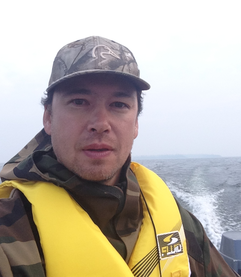 The NWT On The Land Collaborative is a collective of partners from government, industry, philanthropy, and beyond, working together to support land-based programs and projects in the NWT. Each of these partner organizations has a representative that participates in quarterly meetings and annual funding decisions. This is the fifth in a series of profiles of the people and organizations that make the Collaborative possible. You can read the other profiles here. In 2014, Steve Ellis, the recently appointed Northern Lead for Tides Canada, found himself with a bit of money for an on the land camp in the Dehcho. He quickly realized the money wouldn't go very far. At the same time, he was aware that his was not the only organization supporting land-based programs in the NWT, so Steve arranged a meeting with Debbie Delancey, Deputy Minister for Health and Social Services. At the time, her department was piloting land-based programs for wellness purposes. The gist of that meeting, to borrow from Steve, was: "I have some money, you have some money, there are other organizations supporting on the land programs. Maybe we should look at figuring out some way of pooling our resources and making our money work better for us and for the people doing this work on the ground." Debbie agreed. In the weeks that followed, Steve and Debbie reached out to Erin Kelly of Environment and Natural Resources, Kyla Kakfwi-Scott of Health and Social Services, and Rebecca Plotner of Dominion Diamond. The group envisioned a system in which a wide range of organizations could pool their resources, attract additional funding, reduce the administrative burden of people delivering land-based programs, and, most importantly, “empower Northerners to set priorities for how the pooled money should work.” Steve’s employer, Tides Canada, is a philanthropic organization that connects donors and doers to in the pursuit of “a healthy environment, social equity, and economic prosperity for all Canadians.” In recent years, they have put more of their energy into nurturing collaborative funds for just these reasons. A gathering of government, industry, NGOs, and philanthropic organizations later that year to learn more about collaborative funding models from those with experience in Manitoba, British Columbia, and Australia brought the idea one step closer to reality. In the fall of 2015, the NWT On The Land Collaborative was officially launched. In its first year, the Collaborative distributed $480,000 to 35 projects across the territory. At the outset, Steve’s self-described role was that of “catalyst or instigator, depending on your point of view.” He not only initiated the conversation with Debbie, but he and Tides Canada were integral to organizing the November 2014 gathering. As the Collaborative has developed a momentum of its own, Steve has been able to focus more on the responsibilities of a funding partner—securing funds from his organization and participating in the annual review and approval of applications—though he continues to play an important role attracting philanthropic foundations to the Collaborative and he does other administrative work besides. Tides Canada hosts some of the dollars that are part of the Collaborative’s funding pot. They also provide web space and communications support. Steve grew up in Winnipeg. It was while completing a Masters in Environmental Studies at Waterloo that he came north for the first time, to Łutsel K’e, a Denesoline community on the East Arm of Tu Nedhe (Great Slave Lake). Though he didn’t know it at the time, he and his wife Tracey would spend the better part of 15 years living in the community and raising a family. During that time, Steve worked for the Łutsel K’e Dene First Nation and other First Nations in the NWT and BC. Amongst other things, he delivered land-based programs: “I’ve been around long enough to have seen young people fifteen years later who have gone through these types of programs and who attribute change in their lives to these types of programs, so I am definitely a believer in these types of programs.” In 2013, Steve, Tracey, and their three kids moved to Yellowknife and Steve joined Tides Canada. Tides Canada, like Steve, sees on the land programs as vital to ensuring community wellbeing in the North: “Colonialism and trauma is largely responsible for the social issues in many Northern communities. Recovery from the harms of colonialism is about reclaiming what has been lost. On the land programs are great at rebuilding those relationships with community, culture, and the land.” For all of his experience with land-based programs, Steve too has benefitted from his involvement with the Collaborative: “We support a wide range of projects from the classic ‘community moves entire families out into the bush for a long time’ to urban disadvantaged youth spending an afternoon eating traditional food over a fire in a campground. We’re not in a position to judge what is more impactful. It’s depends on where people are and what their circumstances are. One thing I’ve learned through my participation in the Collaborative is that what an on the land program can be can be very, very different, but the outcomes are generally the same.” There is no doubt that the Collaborative had a successful first year. Funders, community advisors, and grant recipients have all been happy with the process. The only complaint is that the need far exceeds the current budget, so Steve’s goal over the coming months is to engage new donors and to encourage existing partners to devote more of their resources to the fund: “Most of the donors are still in the ‘let’s see where this goes’ mindset and I think it will be that way for a few years, but we would like to get to the point where people are comfortable enough with the collaborative approach that larger and larger amounts of the resources they have allocated for on the land programming can be run through the Collaborative.” Steve’s larger ambition is to make the Collaborative indispensable to land-based programming in the NWT. “We’ve wanted to be a one-stop shop and we are a one-stop shop, but I think becoming THE one-stop would be great.” In other words, the Collaborative would become the place to go for learning about innovative programs, best practices, and accessing tools to help with program delivery, as well as funding and resources. Steve also sees potential for the Collaborative to serve as a model for similar initiatives in the other territories. Steve, like other members of the Collaborative, enjoys spending time on the land himself. His Instagram feed of late has documented a hiking trip with Tracey and the kids to Utah and regular trips out to the family’s fish net on Yellowknife bay. Come summer, you are most likely to find the Ellis-Williams clan cruising around Tu Nedhe in a motor boat, with a requisite stop in Łutsel K’e, Steve’s first home in the North and one of the many places he has seen firsthand the value of land-based programming. The NWT On The Land Collaborative depends on partners like Tides Canada to support land-based initiatives in the NWT. If your organization is interested in becoming a partner, please contact Steve Ellis ([email protected]). |
AuthorWrite something about yourself. No need to be fancy, just an overview. Archives
April 2021
Categories |
 RSS Feed
RSS Feed